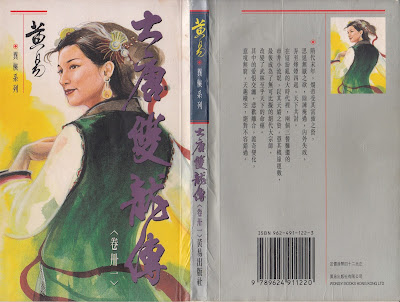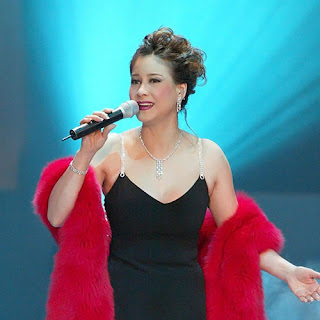Teresa Carpio
1. Teresa Carpio ("杜麗莎") was born in Hong Kong in 1956 to a Filipino father and a Hong Kong Chinese mother.
Her father Fernando Carpio was a noted jazz drummer in Hong Kong in the 1960s and 1970s.
Although she did well academically in elementary school, Teresa Carpio did not attend secondary school because her family was poor.
She started singing in her early teens to help out with family finances.
Teresa Carpio became a top Hong Kong singer in the 1960s and 1970s but she sang mainly English songs.
Terea did not began singing Cantopop until the 1980s.
Teresa has been teaching music since the 1990s and she is the singing teacher of many noted Cantopop singers.
2. If ("假如") is one of the signature songs of Teresa Carpio and the song came out in 1983.
"If" is the Cantonese version of the Mandarin song "Yes or Nay?” ("是否") sang by Julie Su.
I have blogged "Yes or Nay?” back in 2012:
http://culture-in-criticism.blogspot.ca/2012/01/music-julie-su-yes-or-nay.html
Teresa Carpio of Hong Kong and Julie Su of Taiwan are very good singers of the same calibre.
After listening to the many versions of "If" in YouTube, I have come to the conclusion that she completely defines this song and however she sings this song is an "official" version of the song.
This song is as touching as I first listened to it some 30 odd years ago.
3. Teresa Carpio in a Chinese TV show in 2017:
https://www.youtube.com/watch?v=oCMHKMmBCxQ
Isn't her voice amazing at 61 years old?
The last part of the video is a stanza from the original Mandarin "Yes or Nay?” .
4. The same video as "3" above with Jane Zhang of China singing a version of "Yes or Nay?” after Teresa:
https://www.youtube.com/watch?v=d7p-yhwpihw
5. Teresa Carpio singing in a concert in 2017 celebrating the works of the lyricist Andrew Lam, whom wrote the lyrics for this song.
First of two songs:
https://www.youtube.com/watch?v=kvxyu6nRcaE
and another one:
https://www.youtube.com/watch?v=VsL2QIKpJpY
6. Teresa Carpio in a charity concert in 2015.
The second song starting at the 1:40 minutes mark:
https://www.youtube.com/watch?v=ovVIyBtxPFg
7. Teresa Caprio in a joint concert with Alan Tam in 2012.
Teresa sang a song of Alan's and he in turn sang "If".
Second of two songs starting at the 2:35 minutes mark:
https://www.youtube.com/watch?v=h80vxZIYaYE
8. Teresa Carpio in a joint concert with George Lam in 2007:
https://www.youtube.com/watch?v=GOTYWCeiMzg
9. Teresa Carpio appearing as a guest in a concert by her student Sammi Cheng in 2004:
https://www.youtube.com/watch?v=CqdnSlpAbfA
10. Teresa Carpio and the Hong Kong Philharmonic Orchestra in 2003 (?):
https://www.youtube.com/watch?v=9qhsS6IBljs
11. A CD from 1988:
https://www.youtube.com/watch?v=4BLhBTCZe_k
12. A TV music video from 1984:
https://www.youtube.com/watch?v=4ixXhuR6nbA
13. Others:
https://www.youtube.com/watch?v=y6ImIarg688
https://www.youtube.com/watch?v=pm0U8cryWnA
https://www.youtube.com/watch?v=ObzWPGguAmI
14. The Lyrics in Traditional Chinese:
假如 -- 杜麗莎
作詞:林敏聰
作曲:羅大佑
編曲:Nathan Wang
假如 真的要我跟你分別
假如 真的要說分手
請求 把我愉快記憶都洗去
才能免我一生也在默默痛苦
假如 真的要我跟你分別
請求 不要讓我知道
假如 乾了淚水中的雙眼
可否 不再剩下我不顧
只求 再度尋獲你曾在心頭
留低的愛 跟那情深的維護
請容 我在期望有日在將來
能讓你會明白我仍在痛苦
假如 不許我再跟你生活
世上 不必存著有我
假如 天意讓我此生得不到你
不必 需要有天意
只求 再度尋獲你曾在心頭
燃燒的愛 跟那情深的維護
請容 我在期望有日在將來
能讓你會明白我仍在痛苦
假如 不許我再跟你生活
世上 不必存著有我
假如 天意讓我此生得不到你
不必 需要有天意
15. The Lyrics in Simplified Chinese:
假如 -- 杜丽莎
作词:林敏聪
作曲:罗大佑
编曲:Nathan Wang
假如 真的要我跟你分别
假如 真的要说分手
请求 把我愉快记忆都洗去
才能免我一生也在默默痛苦
假如 真的要我跟你分别
请求 不要让我知道
假如 干了泪水中的双眼
可否 不再剩下我不顾
只求 再度寻获你曾在心头
留低的爱 跟那情深的维护
请容 我在期望有日在将来
能让你会明白我仍在痛苦
假如 不许我再跟你生活
世上 不必存着有我
假如 天意让我此生得不到你
不必 需要有天意
只求 再度寻获你曾在心头
燃烧的爱 跟那情深的维护
请容 我在期望有日在将来
能让你会明白我仍在痛苦
假如 不许我再跟你生活
世上 不必存着有我
假如 天意让我此生得不到你
不必 需要有天意
16. Names, Words and Phrases
Alan Tam (Traditional Chinese: 譚詠麟; Simplified Chinese: 谭咏麟).
Andrew Lam (Traditional: 林敏驄; Simplified: 林敏骢).
George Lam (Traditional: 林子祥; Simplified: 林子祥).
Jane Zhang (Traditional: 張靚穎; Simplified: 张靓颖).
Julie Su (Traditional: 蘇芮; Simplified: 苏芮).
Sammi Cheng (Traditional: 鄭秀文; Simplified: 郑秀文).
Teresa Carpio (Traditional: 杜麗莎; Simplified: 杜丽莎).
References:
"Teresa Carpio", Wikipedia - The Free Encyclopedia,
https://en.wikipedia.org/wiki/Teresa_Carpio
(accessed 2017-10-30).
"杜麗莎", Wikipedia - The Free Encyclopedia,
https://zh.wikipedia.org/zh-hk/%E6%9D%9C%E9%BA%97%E8%8E%8E
(accessed 2017-10-30).
"杜麗莎", Wikipedia - The Free Encyclopedia,
https://zh-yue.wikipedia.org/wiki/%E6%9D%9C%E9%BA%97%E8%8E%8E
(accessed 2017-10-30).
End.
























